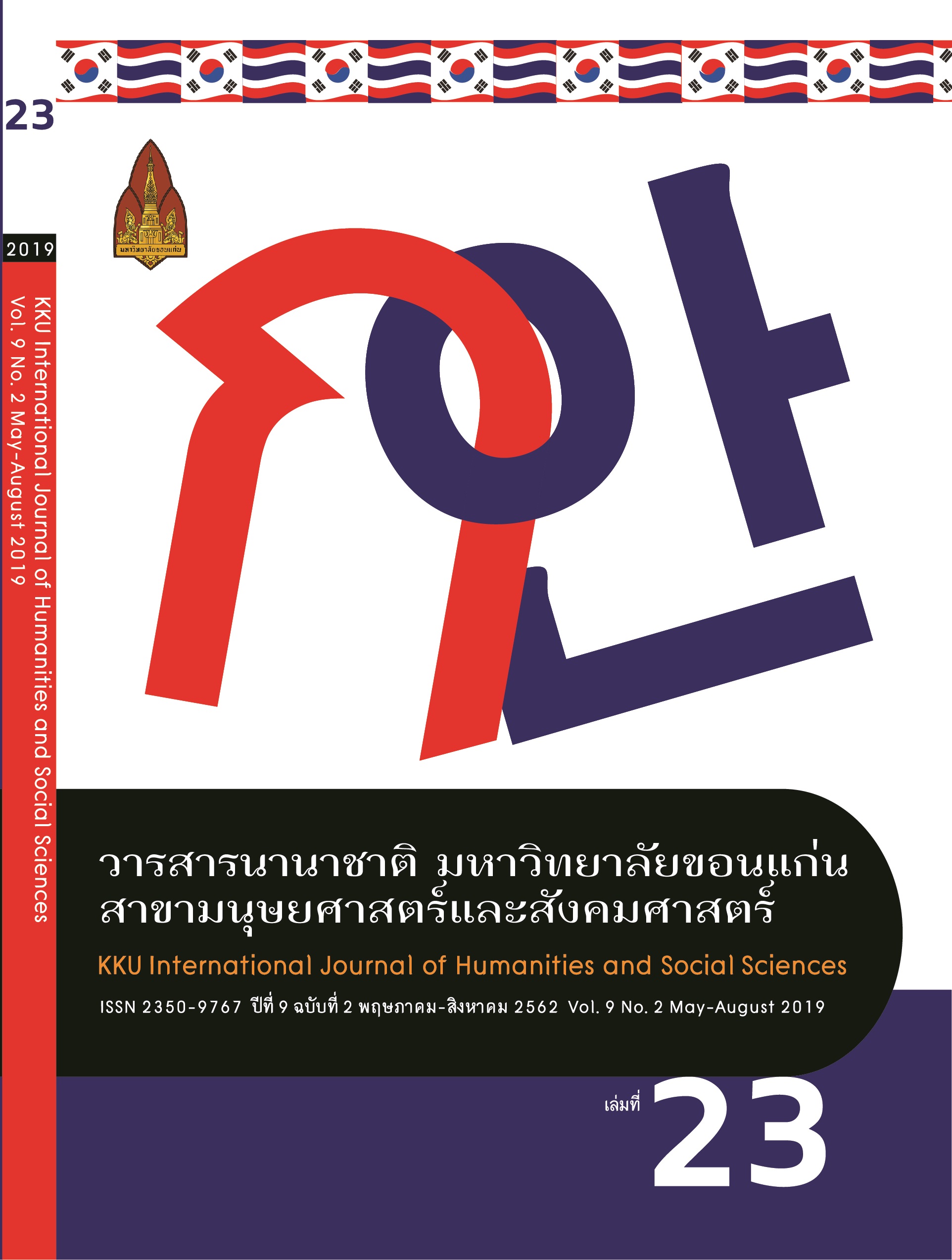Enhancing Linguistic Communication through Code-Switching: Language Usages of Bilingual Korean and Thai Students in Higher Education Contexts
Main Article Content
Abstract
This study investigates Korean and Thai bilingual students’ usage of code-switching in higher education contexts and explores whether or not it has any effects on their linguistic performance. Comprehensive understanding on the functions of code-switching and reasons of switching between languages are crucial in grasping the uniqueness of bilinguals’ discourses. In order to explore bilingual students’ linguistic behaviors, this study focuses on the topic and/or content of dialogs as the main factors influencing their communication. Based on the notion that code-switching affects linguistic performance, twenty-two undergraduate bilingual students’ code-switching practices are discussed. The data reveal that there are three positive effects bilingual students experience due to code-switching; they, 1) display proficiency and confidence; 2) deliver information clearly and effectively without avoiding specific information; and 3) recognize the smoothness of the discourse. Furthermore, the data suggest that the code-switching practices are largely driven by socio-cultural norms of the society regardless of their cultural background. The participants perceive that code-switching enriches their dialog most of the time though certain societal factors may put pressure on them to resist from doing so. The study employed qualitative methods to collect and analyze the data. By encapsulating the participants’ perceptions, this study provides insights on pragmatic and pedagogical repercussions in understanding bilingual students’ use of code-switching in Thai and Korean HE contexts.
Article Details
References
theory. American journal of educational research, 1(5),
162-167.
Appadurai, A. (1996). Modernity al large: cultural dimensions of globalization
(Vol. 1). Minneapolis: University of Minnesota Press.
Auer, P. (Ed.). (2013). Code-switching in conversation: Language, interaction
and identity. London: Routledge.
Ayeomoni, M. O. (2006). Code-switching and code-mixing: Style of language
use in childhood in Yoruba speech community. Nordic Journal of
African Studies, 15(1), 90-99.
Bailey, G., & Peoples, J. (2013). Essentials of cultural anthropology. Boston:
Cengage Learning.
Baker, W. (2008). A critical examination of ELT in Thailand: The role of
cultural awareness. Regional English Language Centre Journal, 39(1),
131-146.
Bista, K. (2010). Factors of Code Switching among Bilingual English Students
in the University Classroom: A Survey. English for Specific Purposes
World, 9(29), 1-19.
Bullock, B. E., & Toribio, A. J. E. (2009). The Cambridge handbook of linguistic
code-switching. Cambridge University Press.
Chan, K. L. R. (2018). Being a ‘purist’ in trilingual Hong Kong: Code-switching
among Cantonese, English and Putonghua. Linguistic Research, 35(1),
75-95.
Cook, V. (2001). Using the first language in the classroom. Canadian Modern
Language Review, 57(3), 402-423.
Fishman, J. A. (2000). Can Threatened Languages Be Saved? Reversing
Language Shift Revisited: A 21st Century Perspective. Clevedon:
Multilingual Matters.
Fromkin, V. (2000). Linguistics: An introduction to linguistic theory. Malden,
MA: Blackwell Publishing.
Gafaranga, J. (2007). Code-switching as a conversational strategy. In peter
Auer & Li Wei (eds.), Handbook of Multilingualism and Multilingual
Communication, 313-279. Berlin & New York: Mouton de Gruyter.
Green, D. W., & Wei, L. (2014). A control process model of code-switching.
Language, Cognition and Neuroscience, 29(4), 499-511.
Hall, E. T. (1976). Beyond culture. Garden City, NY: Anchor Press.
Hamers, J. F., & Blanc, M. H. (2000). Bilinguality and bilingualism. Cambridge:
Cambridge University Press.
Heredia, R. R., & Altarriba, J. (2001). Bilingual language mixing: Why do
bilinguals code-switch? Current Directions in Psychological Science,
10(5), 164-168.
Idrus, F. (2016). Exploiting the CIPRS model to analyse request performance
used by second language speakers in an intercultural setting.
Cross-Cultural Communication, 12(6), 47-53.
Kamberelis, G., & Dimitriadis, G. (2013). Focus groups. London: Routledge.
Kim, E. (2006). Reasons and Motivations for Code-mixing and
Code-switching. Issues in EFL, 4(1), 43-61.
Liu, J. (2010). Teachers’ code-switching to the L1 in EFL classroom. The Open
Applied Linguistics Journal, 3(10), 10-23.
Luna, D., & Peracchio, L. A. (2005). Advertising to bilingual consumers: The
impact of code-switching on persuasion. Journal of Consumer
Research, 31(4), 760-765.
McKay, S. L. (2002). Teaching English As An International Language:
Rethinking Goals and Perspectives. New York: Oxford University Press.
Moore, D. (2006). Plurilingualism and strategic competence in context.
International Journal of Multilingualism, 3(2), 125-138.
Park, J. S. Y. (2009). The local construction of a global language: Ideologies
of English in South Korea (Vol. 24). Berlin: Walter de Gruyter.
Skiba, R. (1997). Code switching as a countenance of language interference.
The Internet TESL Journal, 3(10), 1-6.
Sohn, H. (2006). Korean Language in Culture and Society. University of Hawai‘i
Press: KLEAR Textbooks.
Song, Y., & Andrews, S. J. (2009). The L1 in L2 learning: Teachers’ beliefs and
practices. Muenchen: Lincom Europa.
Wray, A., & Grace, G. W. (2007). The consequences of talking to strangers:
Evolutionary corollaries of socio-cultural influences on linguistic form.
Lingua, 117(3), 543-578.
Yule, G. (1996). The study of language. Cambridge: Cambridge University
Press.


